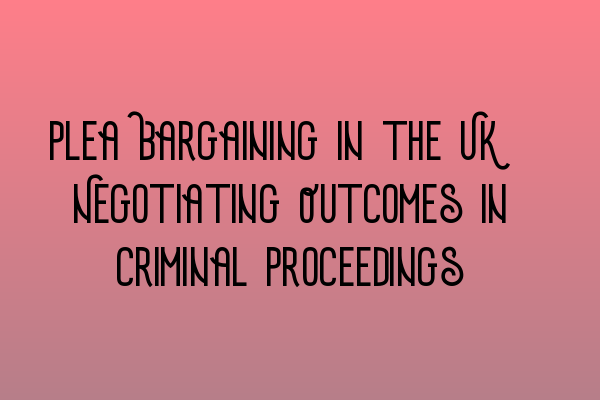Plea Bargaining in the UK: Negotiating Outcomes in Criminal Proceedings
At SQE Criminal Law & Practice Law UK, we understand the complexities of criminal proceedings and the importance of achieving favorable outcomes for our clients. One strategy that can be utilized to achieve such outcomes is plea bargaining. In this article, we will delve into the concept of plea bargaining in the UK and how it allows for negotiations in criminal cases to reach mutually beneficial resolutions.
Understanding Plea Bargaining
Plea bargaining is a process where the prosecution and the defense engage in negotiations to reach a plea agreement. The aim is to secure a deal that is agreeable to both parties and may involve the defendant pleading guilty to a lesser charge or receiving a reduced sentence. Plea bargaining offers several benefits for both the prosecution and the defense.
For the prosecution, it allows for a more efficient use of resources. By reaching a plea agreement, the prosecution can avoid the time and expense of a full trial, especially in cases where the evidence is strong but there may be mitigating factors. Additionally, by securing a guilty plea, the prosecution can ensure a conviction and move forward with other cases.
On the other hand, plea bargaining can benefit the defense by potentially reducing the charges or penalties faced by the defendant. This can result in lesser fines, shorter imprisonment terms, or even alternative sentencing options such as probation or community service. By avoiding a trial, the defendant also eliminates the risk of a harsher outcome if found guilty.
The Process of Plea Bargaining
The process of plea bargaining typically involves a series of negotiations between the prosecution and the defense. The exact steps may vary depending on the case, but generally follow a similar pattern:
- Initial Assessment: The defense, in consultation with their solicitor, assesses the strengths and weaknesses of the case to determine if plea bargaining is a viable option.
- Discussion: The defense and prosecution engage in discussions to explore potential agreements.
- Proposal: The defense presents a proposal to the prosecution, outlining the terms of the proposed plea agreement.
- Consideration: The prosecution evaluates the proposal and may counter with their own terms.
- Finalization: If both parties agree to the terms, the plea agreement is finalized and presented to the court for approval.
It is important to note that plea bargaining is not always a guarantee and depends on various factors such as the strength of the evidence, the nature of the crime, the defendant’s criminal history, and the willingness of both parties to negotiate. Additionally, the court has the final say in approving or rejecting the plea agreement.
Advantages and Disadvantages of Plea Bargaining
Plea bargaining offers several advantages in the criminal justice system:
- Efficiency: Plea agreements help reduce the burden on the court system by disposing of cases more swiftly, thus allowing for a more efficient allocation of resources.
- Certainty: By reaching a plea agreement, both the prosecution and the defense gain certainty in the outcome, eliminating the risks and uncertainties associated with a trial.
- Flexibility: Plea bargaining allows for tailored resolutions that address the unique circumstances of the case, resulting in potentially fairer outcomes.
However, there are also potential disadvantages to consider:
- Perception of leniency: Plea agreements may be criticized for seemingly lenient sentences, leading to public dissatisfaction and concerns about the fairness of the criminal justice system.
- Pressure to plead guilty: Defendants may feel pressured to accept a plea agreement even if they believe they are not guilty in order to avoid the potential consequences of going to trial.
- Inequality: Plea bargaining can lead to unequal outcomes, as individuals with better legal representation or bargaining power may secure more favorable deals.
Overall, plea bargaining is a complex process that requires careful consideration by both the prosecution and the defense. It can be an effective strategy to achieve favorable outcomes in criminal proceedings, but it is important to navigate the process with the guidance of experienced solicitors who understand the intricacies of plea bargaining.
